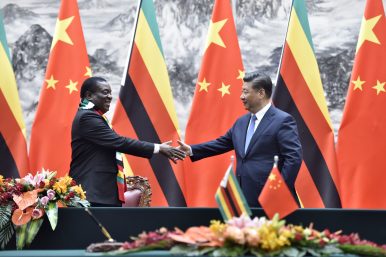Beijing pivoted quickly to embrace Mugabe’s successor, and now welcomes President Mnangagwa for a state visit.
Zimbabwean President Emmerson Mnangagwa, left,
shakes hands with Chinese President Xi Jinping
as they pose for the media after a signing ceremony at the Great Hall of the People in Beijing, China, (April 3, 2018).
( Image Credit: Parker Song/Pool Photo via AP)
Zimbabwe’s President Emmerson Mnangagwa will be in China from April 2 to 6 for a state visit, his first to the country since assuming office after a military intervention forced long-time President Robert Mugabe to step down. In a meeting with Chinese President Xi Jinping, Mnangagwa promised to keep ties close, while Xi proclaimed a “new chapter” in China-Zimbabwe relations.
China developed deep ties with Zimbabwe under Mugabe, starting from providing support to his Zimbabwe African National Union (Zanu) during the Rhodesian Bush War in the 1970s. Ties solidified with Mugabe leading the country, as his repressive practices isolated Zimbabwe from other potential backers. Today, China is Zimbabwe’s top export market and accounts for nearly three-quarters of all foreign direct investment into the country (mainly centered on energy, mining, and agriculture projects). Beijing has also promised billions of dollars in aid. The relationship was so close that Xi Jinping described the two as “all weather friends” during a visit to Zimbabwe in 2015.
In talks with Mnangagwa, Xi reaffirmed China and Zimbabwe’s “all weather” friendship, according to Xinhua. Going further, the two sides announced that they would elevate their relationship to a comprehensive strategic partnership. Xi also specifically said that China was “glad to see” Zimbabwe starting a “new journey in building their country” under Mnangagwa, and offered Beijing’s support for those efforts.
In response, Mnangagwa said that Zimbabwe “would never forget China’s long-term assistance,” according to a Xinhua paraphrase. He also promised to continue to back China’s core interests, from the one China policy to the Belt and Road Initiative. Mnangagwa’s visit itself is a sign of the importance he attaches to relations with China; it’s his first state visit outside the African continent since assuming the presidency.
Mnangagwa is particularly hoping to seal economic deals during his visit. In a speech in Beijing, Mnangagwa emphasized the importance of foreign investment to Zimbabwe’s economic revitalization, and provided a laundry list of areas for consideration: transportation infrastructure (including roads and railways); energy, water, and communications infrastructure; mining, agriculture, tourism, manufacturing, and financial services. In addition to Beijing, he is scheduled to travel to the provinces of Anhui and Zhejiang, according to Zimbabwe’s The Herald, where he will meet with “the business community.”
